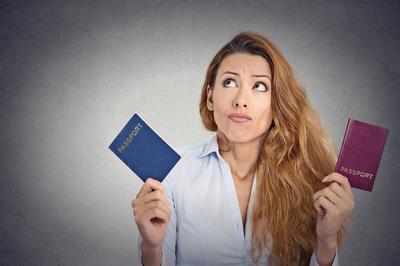Dual citizens have citizenship in both the U.S. and another country. Although dual citizens enjoy the benefits of being citizens of two countries, conflicts of law may also arise that can threaten their rights and safety.
On this page, our Las Vegas immigration lawyers discuss dual citizenship laws in Nevada. Click on a topic to learn more.
- 1. What is “dual citizenship”?
- 2. How do I get “dual citizenship”?
- 3. How does foreign policy affect my status?

1) What is “dual citizenship”?
Dual citizenship is when an individual is a citizen of both the United States and another country at the same time. An individual who has dual citizenship must follow each country’s respective citizenship laws, such as paying taxes.1
However, note that it is uncertain whether someone can legitimately have dual citizenship. When someone naturalizes he/she has to take the Oath of Allegiance, which requires he/she renounce all other country affiliations; however, debate persists as to whether the US government can force someone to renounced citizenship in another country. In general, foreigners seeking naturalization should presume that they will no longer be a citizen of their home country following the naturalization ceremony; but depending on which country they come from, they might still retain the status of a national of that country.
2) How does a person acquire “dual citizenship”?
There are five main ways that an individual may become a dual citizen of the U.S. and another country:

- Automatically by birth. A child of U.S. citizens who is born abroad is likely to be considered both a U.S. citizen as well as a citizen of his/her birth country. Conversely, babies born by foreign parents on U.S. soil usually have dual citizenship. (Learn about citizenship through parents in Nevada.)
- Marriage by choice. In most cases, U.S. citizens may acquire foreign citizenship through marriage to a foreigner. Conversely, non-citizens who marry U.S. citizens may be able to become U.S. citizens while remaining citizens of their home country. (Learn about spousal visas in Nevada and fiancé visas in Nevada.)
- Naturalization. Aliens who become naturalized as U.S. citizens may be able to keep citizenship with their home country. (Learn more about naturalization in Nevada.)
- Involuntary granting. A U.S. citizen who is involuntarily granted another citizenship does not risk losing U.S. citizenship.
- Choice with intent. A U.S. citizen who applies for foreign citizenship may keep his/her U.S. citizenship as long as he/she shows no intention of given up U.S. citizenship. Intent can be shown by the person’s statements or conduct.2
3) How does foreign policy affect my status?
Dual nationals are mandated to obey the laws of both the U.S. and the foreign country. Either country maintains the right to enforce its laws, especially if the individual travels there. However, sometimes the two countries’ laws come into conflict.

Dual nationality might limit efforts by the U.S. Government to provide aid and assistance to citizens abroad. The country where a dual national is located will usually exercise a more powerful claim to that individual’s allegiance.
Passports:
Typically, the majority of U.S. citizens including dual nationals must utilize a valid U.S. passport to both enter and leave the U.S. Dual nationals may also be expected by the foreign country to use its own passport to enter and leave that country. So always know the other country’s exit/entry rules before traveling to and from that country and be sure to carry the correct passport. A U.S. citizen will not be punished for using a foreign passport.3
Legal References:
- 1 Dual Nationality, U.S. Department of State.

